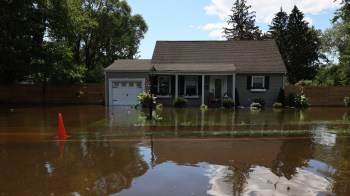Congress votes to reduce flood-insurance rates—that they raised
Congress votes to reduce flood-insurance rates—that they raised
Back in 2012, Congress voted to revamp the National Flood Insurance Program, which is run—and subsidized—by the federal government.
Big storms like Katrina had left the program deeply in the red. And the maps showing which areas had the biggest risk for storms—and where property-owners should be charged higher premiums—were decades out of date.
New Orleans was a prominent example. By year’s end, SuperStorm Sandy had added New York and New Jersey to the list—and pushed the flood program’s deficit to $24 billion.
But in 2013, as the maps started getting updated, coastal residents freaked out: The updated maps made them high-risk homeowners, and their flood-insurance premiums shot up accordingly.
Realtors raised a stink too. Some homes—often those at the highest risk of flood damage—received subsidized flood-insurance rates, and the 2012 law said that if a home was sold, the new owner would not get the subsidy. Which made those homes harder to sell.
The new legislation, which passed the house 306-91, effectively restores things to the way they were before 2012 to most of those people. Anybody who was going to be re-mapped into a higher rate? The new maps won’t apply to them, as long as they already had flood insurance, says Jim Ellis, Vice President of Taxpayers for Common Sense.
And it keeps a lot of the subsidies in place.
Proponents say the new changes would not cost taxpayers money, because the bill includes a surcharge on all flood insurance policies: $25 for most properties, and a higher rate, $250, for vacation homes and businesses.
Opposing the measure was an interesting coalition that included environmental groups like the Sierra Club and the Natural Resources Defense Council and anti-tax conservative groups like the National Taxpayers Union.
They have two big complaints: One is that the homes that receive subsidies are often the riskiest properties—that’s why the homeowners need subsidies. This doesn’t create any incentive to flood-proof a beach house.
And the other is that the subsidies aren’t means-tested: So the person who owns a beach house gets the same subsidy as the person who pours their coffee at the nearby Starbucks.
Robert Hartwig is President of the Insurance Information Institute, which is backed by the insurance industry. His group wasn’t part of the coalition opposing the bill, but he has strong opinions about what it means.
“What we can expect to see going forward is continuing accumulation of deficits by the National Flood Insurance Program,” he says. He’s not sure how much the proposed surcharges will mitigate them. “We’re also going to see reduced incentives to mitigate against future floods.”
Floods that he thinks are likely. “If you believe anything at all, even about the mildest expected changes associated with climate change or sea-level rise,” he says, “you can expect that more coastal-innundation”—more floods—“in the future.”
There’s a lot happening in the world. Through it all, Marketplace is here for you.
You rely on Marketplace to break down the world’s events and tell you how it affects you in a fact-based, approachable way. We rely on your financial support to keep making that possible.
Your donation today powers the independent journalism that you rely on. For just $5/month, you can help sustain Marketplace so we can keep reporting on the things that matter to you.


















